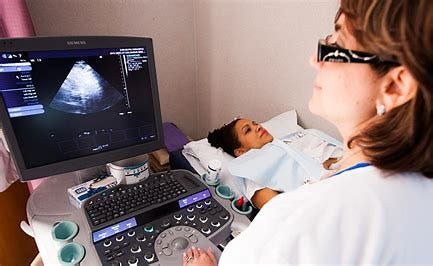CAREER OPTIONS IN ULTRASOUND

A career in ultrasound, also known as diagnostic medical sonography, offers various opportunities for individuals interested in medical imaging and healthcare. Here are some career options in ultrasound:
- Diagnostic Medical Sonographer: These professionals operate ultrasound equipment to produce images of the body’s internal structures. They work closely with physicians to assist in the diagnosis and treatment of medical conditions. There are specialties within diagnostic medical sonography, such as abdominal, obstetric and gynecological, vascular, and cardiac sonography.
- Cardiac Sonographer (Echocardiographer): Specializing in imaging the heart, cardiac sonographers use ultrasound to create detailed pictures of the heart’s chambers, valves, and blood vessels. This helps in assessing heart function and identifying cardiac issues.
- Vascular Technologist: Vascular technologists specialize in imaging blood vessels and blood flow to detect issues such as blood clots, arterial blockages, or venous disorders. They may work in hospitals, clinics, or vascular laboratories.
- Obstetric and Gynecologic Sonographer: These sonographers focus on imaging the female reproductive system, including monitoring fetal development during pregnancy. They play a crucial role in providing information about the health of the fetus and supporting obstetricians in managing pregnancies.
- Musculoskeletal Sonographer: Specializing in imaging muscles, tendons, ligaments, and joints, musculoskeletal sonographers assist in diagnosing conditions such as injuries, arthritis, or tumors affecting the musculoskeletal system.
- Pediatric Sonographer: Working with children and infants, pediatric sonographers specialize in imaging pediatric organs and tissues. They collaborate with pediatricians to diagnose and monitor various medical conditions in young patients.
- Research and Development: Some professionals in ultrasound pursue careers in research and development, working for companies that develop and improve ultrasound technology. They may be involved in designing new equipment, enhancing imaging techniques, or conducting clinical trials.
- Education and Training: Experienced sonographers may choose to become educators, teaching ultrasound techniques and principles to students in educational institutions, hospitals, or training programs.
- Management and Administration: Sonographers with experience and leadership skills may transition into managerial or administrative roles within healthcare settings, overseeing ultrasound departments or clinics.
- Mobile Sonography Services: Some sonographers work for mobile ultrasound services, providing imaging services at various locations, including hospitals, clinics, and patients’ homes.
To pursue a career in ultrasound, individuals typically need formal education and training in diagnostic medical sonography, usually through an accredited program. Certification by professional organizations, such as the American Registry for Diagnostic Medical Sonography (ARDMS) or Cardiovascular Credentialing International (CCI), is often required or preferred for employment. Additionally, staying updated on advancements in technology and techniques through continuing education is essential in this field. If you really interested to build a career in ultrasound. join ultrasound certification courses in StudyUltrasound is the best option.

Comments
Post a Comment